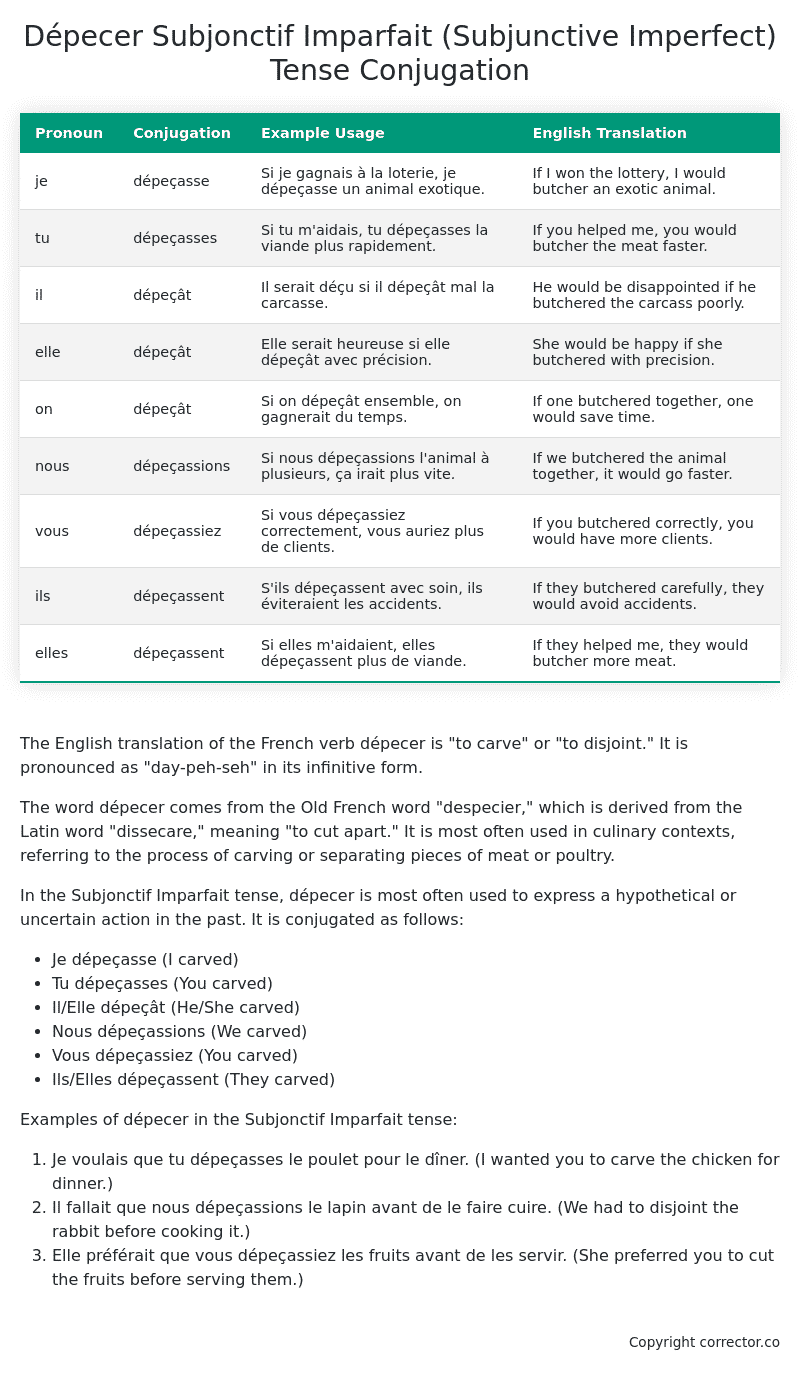Subjonctif Imparfait (Subjunctive Imperfect) Tense Conjugation of the French Verb dépecer
Introduction to the verb dépecer
The English translation of the French verb dépecer is “to carve” or “to disjoint.” It is pronounced as “day-peh-seh” in its infinitive form.
The word dépecer comes from the Old French word “despecier,” which is derived from the Latin word “dissecare,” meaning “to cut apart.” It is most often used in culinary contexts, referring to the process of carving or separating pieces of meat or poultry.
In the Subjonctif Imparfait tense, dépecer is most often used to express a hypothetical or uncertain action in the past. It is conjugated as follows:
- Je dépeçasse (I carved)
- Tu dépeçasses (You carved)
- Il/Elle dépeçât (He/She carved)
- Nous dépeçassions (We carved)
- Vous dépeçassiez (You carved)
- Ils/Elles dépeçassent (They carved)
Examples of dépecer in the Subjonctif Imparfait tense:
- Je voulais que tu dépeçasses le poulet pour le dîner. (I wanted you to carve the chicken for dinner.)
- Il fallait que nous dépeçassions le lapin avant de le faire cuire. (We had to disjoint the rabbit before cooking it.)
- Elle préférait que vous dépeçassiez les fruits avant de les servir. (She preferred you to cut the fruits before serving them.)
Table of the Subjonctif Imparfait (Subjunctive Imperfect) Tense Conjugation of dépecer
| Pronoun | Conjugation | Example Usage | English Translation |
|---|---|---|---|
| je | dépeçasse | Si je gagnais à la loterie, je dépeçasse un animal exotique. | If I won the lottery, I would butcher an exotic animal. |
| tu | dépeçasses | Si tu m’aidais, tu dépeçasses la viande plus rapidement. | If you helped me, you would butcher the meat faster. |
| il | dépeçât | Il serait déçu si il dépeçât mal la carcasse. | He would be disappointed if he butchered the carcass poorly. |
| elle | dépeçât | Elle serait heureuse si elle dépeçât avec précision. | She would be happy if she butchered with precision. |
| on | dépeçât | Si on dépeçât ensemble, on gagnerait du temps. | If one butchered together, one would save time. |
| nous | dépeçassions | Si nous dépeçassions l’animal à plusieurs, ça irait plus vite. | If we butchered the animal together, it would go faster. |
| vous | dépeçassiez | Si vous dépeçassiez correctement, vous auriez plus de clients. | If you butchered correctly, you would have more clients. |
| ils | dépeçassent | S’ils dépeçassent avec soin, ils éviteraient les accidents. | If they butchered carefully, they would avoid accidents. |
| elles | dépeçassent | Si elles m’aidaient, elles dépeçassent plus de viande. | If they helped me, they would butcher more meat. |
Other Conjugations for Dépecer.
Le Present (Present Tense) Conjugation of the French Verb dépecer
Imparfait (Imperfect) Tense Conjugation of the French Verb dépecer
Passé Simple (Simple Past) Tense Conjugation of the French Verb dépecer
Passé Composé (Present Perfect) Tense Conjugation of the French Verb dépecer
Futur Simple (Simple Future) Tense Conjugation of the French Verb dépecer
Futur Proche (Near Future) Tense Conjugation of the French Verb dépecer
Plus-que-parfait (Pluperfect) Tense Conjugation of the French Verb dépecer
Passé Antérieur (Past Anterior) Tense Conjugation of the French Verb dépecer
Futur Antérieur (Future Anterior) Tense Conjugation of the French Verb dépecer
Subjonctif Présent (Subjunctive Present) Tense Conjugation of the French Verb dépecer
Subjonctif Passé (Subjunctive Past) Tense Conjugation of the French Verb dépecer
Subjonctif Imparfait (Subjunctive Imperfect) Tense Conjugation of the French Verb dépecer (this article)
Subjonctif Plus-que-parfait (Subjunctive Pluperfect) Tense Conjugation of the French Verb dépecer
Conditionnel Présent (Conditional Present) Tense Conjugation of the French Verb dépecer
Conditionnel Passé (Conditional Past) Tense Conjugation of the French Verb dépecer
L’impératif Présent (Imperative Present) Tense Conjugation of the French Verb dépecer
L’infinitif Présent (Infinitive Present) Tense Conjugation of the French Verb dépecer
Struggling with French verbs or the language in general? Why not use our free French Grammar Checker – no registration required!
Get a FREE Download Study Sheet of this Conjugation 🔥
Simply right click the image below, click “save image” and get your free reference for the dépecer Subjonctif Imparfait tense conjugation!

Dépecer – About the French Subjonctif Imparfait (Subjunctive Imperfect) Tense
Formation
Common Everyday Usage Patterns
Interactions with Other Tenses
Subjonctif Présent
Indicatif Passé Composé
Conditional
Conditional Perfect
Summary
I hope you enjoyed this article on the verb dépecer. Still in a learning mood? Check out another TOTALLY random French verb conjugation!


